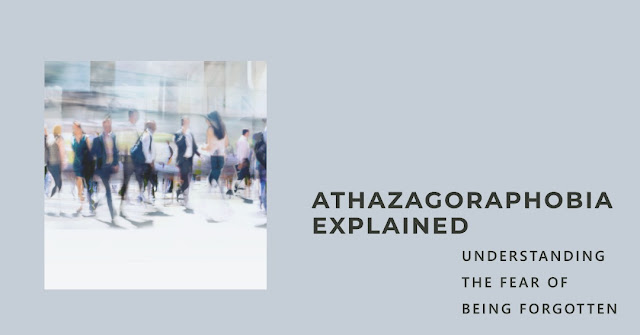Athazagoraphobia Explained: Understanding the Fear of Being Forgotten
Introduction
Athazagoraphobia is a relatively unknown yet complex phobia that affects many people worldwide. This article aims to provide an in-depth understanding of athazagoraphobia, its causes, symptoms, and potential treatment options. By exploring this topic, we hope to raise awareness and provide support for those who may be struggling with this fear.
I. What is Athazagoraphobia?
A. Definition :
Athazagoraphobia is the irrational and persistent fear of being forgotten, ignored, or replaced. This phobia can manifest in various ways, such as the fear of being forgotten by loved ones, being overlooked at work, or being replaced in social circles.
B. Prevalence :
While the exact prevalence of athazagoraphobia is unknown, it is believed to affect a significant number of people. As with many phobias, the severity of the fear can vary greatly from person to person.
II. Causes of Athazagoraphobia
A. Psychological Factors
- Past Traumatic Experiences: A history of abandonment, neglect, or rejection can contribute to the development of athazagoraphobia.
- Low Self-Esteem: Individuals with low self-esteem may be more prone to fearing that they are not important or valuable enough to be remembered.
- Anxiety Disorders: Those with existing anxiety disorders may be more susceptible to developing phobias, including athazagoraphobia.
B. Environmental Factors
- Social Media: The rise of social media has increased the pressure to maintain an online presence, which can exacerbate the fear of being forgotten.
- Competitive Work Environments: High-pressure work environments can contribute to the fear of being replaced or overlooked.
III. Symptoms of Athazagoraphobia
A. Emotional Symptoms
- Intense Anxiety: The thought of being forgotten can trigger overwhelming anxiety and panic.
- Persistent Worry: Those with athazagoraphobia may constantly worry about their relationships and social standing.
- Depression: The fear of being forgotten can lead to feelings of sadness and hopelessness.
B. Physical Symptoms
- Rapid Heartbeat: Anxiety and panic can cause an increased heart rate.
- Shortness of Breath: Difficulty breathing is a common symptom of anxiety disorders, including athazagoraphobia.
- Sweating: Excessive sweating can occur during episodes of intense fear.
C. Behavioral Symptoms
- Avoidance: Individuals with athazagoraphobia may avoid social situations or relationships to prevent the possibility of being forgotten.
- Reassurance-Seeking: Those with this phobia may frequently seek reassurance from others that they are not being forgotten or replaced.
- Overcompensation: Some individuals may overcompensate by trying to be overly memorable or constantly reminding others of their presence.
IV. Treatment Options for Athazagoraphobia
A. Therapy
- Cognitive-Behavioral Therapy (CBT): CBT can help individuals identify and challenge irrational thoughts related to their fear of being forgotten.
- Exposure Therapy: Gradual exposure to the feared situation can help desensitize individuals to their fear.
- Group Therapy: Sharing experiences and coping strategies with others who have similar fears can provide support and encouragement.
B. Medication
- Antidepressants: Selective serotonin reuptake inhibitors (SSRIs) and serotonin-norepinephrine reuptake inhibitors (SNRIs) can help manage anxiety and depression associated with athazagoraphobia.
- Anti-Anxiety Medications: Benzodiazepines may be prescribed for short-term relief of severe anxiety symptoms.
C. Alternative Treatments
- Mindfulness and Meditation: Practicing mindfulness and meditation can help individuals manage anxiety and improve overall mental well-being.
- Relaxation Techniques: Deep breathing exercises, progressive muscle relaxation, and visualization can help reduce anxiety symptoms.
V. Coping Strategies for Athazagoraphobia
A. Building Self-Esteem
- Positive Affirmations: Repeating positive statements about oneself can help improve self-esteem.
- Setting Achievable Goals: Accomplishing small, realistic goals can boost confidence and self-worth.
B. Strengthening Relationships
- Open Communication: Discussing fears and concerns with loved ones can help strengthen relationships and provide reassurance.
- Quality Time: Spending quality time with friends and family can help reinforce feelings of connection and belonging.
C. Seeking Support
- Professional Help: Seeking the guidance of a mental health professional can provide valuable tools and resources for managing athazagoraphobia.
- Support Groups: Joining a support group can provide a safe space to share experiences and learn from others who have similar fears.
Conclusion
Athazagoraphobia is a complex and often misunderstood phobia. By understanding its causes, symptoms, and treatment options, we can better support those who struggle with this fear. It is essential to seek professional help if you or someone you know is experiencing symptoms of athazagoraphobia. With the right support and resources, it is possible to overcome this fear and lead a fulfilling life.




Comments
Post a Comment